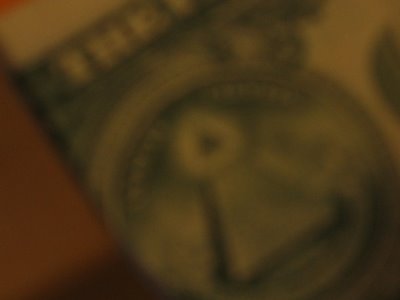Justice is Blind in Paper Money Decision
In a decision that could be called "What is the shape of your money," U.S. District Judge James Robertson handed the Treasury Department an order that bills should be designed for the good of all. In a "sharp" opinion based on the Rehabilition Act and not the ADA, folks will be wondering how having U.S. Dollers being of equal size could be an inequality to anyone. This decision has already revealed the divisions within the "disability rights" world, as the Nattional Federation for the Blind cringes in fear, while the American Council for the Blind leads the way to a revolution in the design of the green-back, but not the "dollar."
As you can see, above, or, if you are vision impared, not see very well, one denomination looks like another in US paper money, unlike the paper money of most other countries. In countries I have traveled to, the shape, size and colour of money differs, making it easy to quickly identify the bill to use to pay for goods and services. It makes it easy, especially for those of us who were not raised in a country that uses the metric system. It sure is hard to read that 1 million printed on the bill in a different language, and I cannot imagine how long it would take to buy a newspaper if I had to count all those zeros! So, if the US does resize the All American Dollar, we will all benifit, as will all tourists, and, oh, by the way, folks who are blind will not have to depend on the kindness of strangers.
Of course there will be those who fear what this change in the shape of the green back will "mean." The American Council of the Blind claims it will give meaningful access to money for those who are blind, or visually impaired, affording them the same independence we all take for granted. Then there are those who have immediately opposed this decision based on the percieved "politics" of the Judge, after all, he was the judge who quit in protest over secret wiretaps by the current Bush Administration. The Government will probably think it means a huge jump in cost for them, but when has that ever deterred the government? Vending machine designers will discover it will not require the redesign of all vending machines, since no one is suggesting that the 1 dollar bill be changed in any way. Oh, well, perhaps folks who want the 1 dollar bill to go away will find some meaning in this decision?
Then there is the interesting stance of the National Federation of The Blind, who states in their press release that this decision is clouding the issue, which is not that the blind cannot redily tell a 1 dollar bill from a 20, but that blind folks are not getting the jobs they deserve. It is the earning of money, and not the making of money that should be the focus of advocasy for the blind, according to the Federation. The Federation claims in one place in their press release that 70% of those (blind) who want to work cannot find employment and therefore do not see money. They fear that if employers get the idea that blind folks cannot see documents they will request all kinds of "accomodations" and so they believe this decision will result in blind folks finding it hard to get a job. Then they state that blind folks who have jobs can ask for all kinds of accomodations to do their jobs, because they cannot see documents.
The interesting issue here is the federation continues to support the blind as dependent (upon them?) upon others, and fears levaling the playing field so the blind are not like little children asking everyone they do business with to pick out the right money, and count back the right money. Remember what a sense of independence, of "feeling grown up", it was when you finally caught on to the "meaning of money." So too, blind folks will be changed by this one step into "adult-hood" by becoming independent from the good will of others during the exchange of goods for money. While the Federation worries about folks having "pity" for the blind, this decision actually removes the need for the blind to ask for pity, or for strangers to count their change for them.
It is high time for the entrenched institutions who have been advocating for PWD's to take the next step, into the world of helping their charges become independent members of the community, well able to contribute acording to their actual abilities. The mark of a good "teacher" is to have the pupil "graduate."
PS: On my Christmas wish list is a square, pink 20 dollar note!

0 Comments:
Post a Comment
<< Home